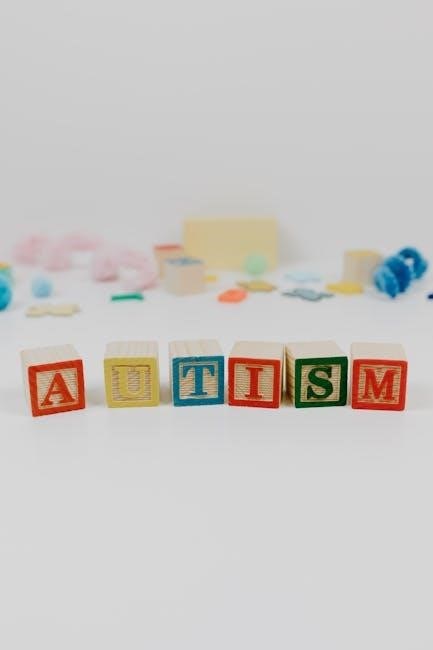Special Education Instructional Aides provide vital support to teachers and students‚ ensuring personalized learning experiences. They collaborate closely with educators‚ assisting in lesson planning and adapting materials for diverse needs.
Overview of the Role
A Special Education Instructional Aide plays a pivotal role in supporting students with diverse learning needs. Their primary responsibility is to assist teachers in delivering tailored instruction‚ ensuring students receive individualized attention. They help prepare educational materials‚ adapt lessons for varying abilities‚ and maintain a structured learning environment. Instructional aides often work one-on-one with students or in small groups‚ reinforcing learning objectives and helping students meet their goals. They also assist with classroom management‚ behavioral support‚ and record-keeping tasks. This role requires strong communication skills‚ patience‚ and the ability to collaborate effectively with teachers and other professionals. By providing essential support‚ Special Education Instructional Aides contribute significantly to creating an inclusive and effective educational setting for all students. Their work is instrumental in helping students with special needs achieve academic and personal growth‚ making their role indispensable in modern education systems.
Importance in Special Education
The role of a Special Education Instructional Aide is crucial in ensuring students with special needs receive the support they require to thrive academically and socially. By assisting teachers‚ these aides help create a more inclusive and effective learning environment. They enable teachers to focus on instructional strategies by handling tasks such as lesson preparation‚ behavioral support‚ and individualized attention for students. Instructional aides play a key role in implementing Individualized Education Programs (IEPs)‚ tailoring instruction to meet each student’s unique needs. Their support fosters independence‚ confidence‚ and skill development in students‚ making a significant difference in their educational journey. Additionally‚ they act as a bridge between teachers‚ students‚ and families‚ ensuring consistent communication and collaboration. The presence of a dedicated instructional aide can greatly enhance student outcomes‚ making their contribution invaluable to the special education system.

Key Responsibilities of a Special Education Instructional Aide
A Special Education Instructional Aide supports teachers‚ assists students with special needs‚ prepares materials‚ and maintains a structured classroom environment‚ ensuring effective learning and student well-being.
Supporting Teachers in the Classroom
Special Education Instructional Aides play a crucial role in supporting teachers by assisting with lesson preparation‚ classroom organization‚ and student supervision. They help create a structured learning environment‚ ensuring teachers can focus on instruction.
Aides often adapt instructional materials to meet individual student needs‚ such as modifying worksheets or preparing visual aids. This customization helps students with diverse abilities engage more effectively with the curriculum.
They also provide behavioral support‚ reinforcing positive classroom conduct and assisting with de-escalation strategies when needed. This support enables teachers to maintain a productive and inclusive learning atmosphere.
Additionally‚ aides often handle administrative tasks‚ such as recording student progress‚ managing supplies‚ and communicating with parents. These responsibilities allow teachers to concentrate on teaching and student development.
By collaborating closely with teachers‚ Special Education Instructional Aides ensure that educational goals are met while fostering a supportive and engaging classroom environment for all students.
Assisting Students with Special Needs
Special Education Instructional Aides work directly with students to provide individualized support tailored to their unique needs. They assist with academic tasks‚ such as reading‚ writing‚ and math‚ and help students complete assignments.
Aides also support students with functional skills‚ such as communication‚ social interactions‚ and daily living activities. They may use adaptive tools or technology to help students access the curriculum.
In addition‚ they reinforce positive behaviors and provide emotional support‚ helping students build confidence and self-esteem. Aides often work one-on-one or in small groups to ensure students receive the attention they need.
They collaborate with teachers to implement Individualized Education Programs (IEPs)‚ tracking student progress and reporting back to educators. This direct support enables students with special needs to participate fully in educational activities.
By addressing each student’s specific challenges and strengths‚ Special Education Instructional Aides play a vital role in fostering inclusive and effective learning environments.
Preparing Instructional Materials
Special Education Instructional Aides are responsible for preparing instructional materials that cater to the diverse needs of students. This involves creating visual aids‚ modifying curriculum resources‚ and organizing educational tools to support lesson plans.
Aides often adapt materials to make them accessible for students with varying learning styles‚ such as enlarging text‚ creating tactile diagrams‚ or developing simplified versions of complex concepts.
They may also assist in gathering and organizing supplies‚ such as worksheets‚ manipulatives‚ and technology‚ ensuring everything is ready for classroom activities.
Collaborating with teachers‚ aides align materials with Individualized Education Programs (IEPs) to meet specific student goals. This preparation ensures that lessons are engaging and tailored to the needs of all learners.
By providing well-prepared materials‚ Special Education Instructional Aides help create a structured and inclusive learning environment that promotes student success and engagement.
Maintaining Classroom Environment
Maintaining a well-organized and supportive classroom environment is a critical responsibility of a Special Education Instructional Aide. This involves ensuring the physical space is safe‚ accessible‚ and conducive to learning for all students‚ particularly those with special needs.
Aides often assist in organizing materials‚ setting up learning stations‚ and arranging furniture to promote engagement and minimize distractions. They also help establish and reinforce classroom routines‚ such as transitions‚ clean-up‚ and behavioral expectations.
By maintaining a structured environment‚ aides contribute to a positive and inclusive atmosphere‚ allowing teachers to focus on instruction. Additionally‚ they may support safety protocols‚ such as supervising students during activities or ensuring adaptive equipment is properly set up.
This role is essential in creating a stable and predictable space where students with diverse needs can thrive academically and socially. The aide’s efforts in maintaining the classroom environment directly impact the overall effectiveness of the educational setting.
Skills and Qualifications Required
A Special Education Instructional Aide must possess a high school diploma‚ patience‚ and strong communication skills. They should be adaptable‚ empathetic‚ and able to follow teacher instructions effectively‚ ensuring support for diverse student needs.
Educational Background and Certification
A Special Education Instructional Aide typically requires a high school diploma or equivalent. Many employers prefer or require postsecondary training or an associate’s degree in special education or a related field. Certifications‚ such as a paraeducator certificate‚ are often necessary and may involve completing a training program or passing a state-specific exam. Some states also require background checks and first aid/CPR certification. Additional training in areas like behavioral support‚ crisis intervention‚ and understanding Individualized Education Programs (IEPs) is highly valued. While a bachelor’s degree is not always required‚ it can be beneficial for advanced roles or career growth. Continuous professional development is encouraged to stay updated on best practices in special education. These qualifications ensure aides are well-prepared to support students with diverse needs effectively.
Essential Skills for the Role
Special Education Instructional Aides must possess strong communication and interpersonal skills to collaborate effectively with teachers‚ students‚ and families. Patience‚ empathy‚ and understanding are crucial when working with students who may have emotional‚ behavioral‚ or physical challenges. Organizational skills are essential for managing multiple tasks‚ such as preparing materials‚ documenting progress‚ and maintaining a structured learning environment. The ability to adapt to individual student needs and flexible classroom dynamics is vital. Instructional aides should also demonstrate problem-solving skills to address unexpected situations. Basic technology proficiency is increasingly important‚ as educational tools and software are integrated into special education settings. Additionally‚ physical stamina may be required to support students with mobility needs. A commitment to confidentiality and ethical practices ensures the protection of student privacy. These skills collectively enable instructional aides to provide effective support‚ fostering an inclusive and productive learning environment for all students.

Instructional Strategies for Special Education
Special education instructional strategies focus on adaptive methods‚ personalized learning plans‚ and inclusive practices to meet diverse student needs effectively.
Adaptive Instructional Methods
Adaptive instructional methods are tailored to meet the unique needs of students with special needs‚ ensuring personalized learning experiences. These methods often involve modifying curriculum materials‚ pacing‚ or delivery to suit individual student requirements; For instance‚ differentiated instruction allows instructional aides to adjust activities based on a student’s learning style‚ abilities‚ and interests. Universal Design for Learning (UDL) is another approach‚ offering flexible ways to engage students and present information. Assistive technology‚ such as text-to-speech tools or communication devices‚ also plays a key role in making learning accessible. Instructional aides collaborate with teachers to implement these strategies‚ creating an inclusive and supportive classroom environment. By focusing on adaptability‚ these methods help students overcome challenges and achieve their educational goals‚ fostering independence and confidence in their learning journey.
Technology Integration in Special Education
Technology integration in special education enhances learning experiences by providing tailored tools and resources for students with diverse needs. Assistive technologies‚ such as text-to-speech software‚ speech-to-text programs‚ and communication devices‚ empower students with disabilities to engage more effectively. Educational apps and interactive platforms offer personalized learning opportunities‚ catering to individual learning styles and abilities. Additionally‚ digital tools like visual schedules and behavior tracking apps help students with autism or emotional challenges stay organized and regulated. Technology also facilitates collaboration between students‚ teachers‚ and instructional aides‚ promoting a more inclusive classroom environment. By leveraging these tools‚ special education instructional aides can create dynamic‚ adaptive‚ and engaging learning experiences that address the unique needs of each student‚ fostering academic growth and independence. Technology integration not only bridges gaps but also opens new avenues for student success in special education settings.

Legal and Ethical Considerations
Special education instructional aides must adhere to legal frameworks like IDEA and FERPA‚ ensuring confidentiality and ethical practices. They play a crucial role in upholding student rights and maintaining trust.
Understanding IEPs and 504 Plans
Instructional aides play a key role in implementing Individualized Education Programs (IEPs) and 504 Plans‚ which are legal documents ensuring students with disabilities receive tailored support. An IEP outlines specific goals‚ services‚ and accommodations for students eligible under IDEA‚ while a 504 Plan provides access to accommodations for students with disabilities under Section 504 of the Rehabilitation Act. Both plans aim to create an inclusive learning environment‚ addressing academic‚ social‚ and physical needs. Instructional aides must understand these documents to effectively support students‚ monitor progress‚ and collaborate with teachers. They assist in documenting student achievements and challenges‚ helping to refine strategies. Knowledge of these plans ensures aides provide consistent and legally compliant support‚ fostering student success and equity in education.
Confidentiality and Ethical Practices
Confidentiality and ethical practices are paramount for special education instructional aides. They handle sensitive student information‚ including IEPs‚ medical records‚ and personal details‚ which must remain confidential under laws like FERPA. Ethical standards require aides to maintain professionalism‚ respect privacy‚ and avoid conflicts of interest. They must uphold honesty‚ integrity‚ and fairness in all interactions with students‚ families‚ and colleagues. Adhering to confidentiality ensures trust and supports a safe learning environment‚ fostering positive relationships and ethical decision-making. These practices are essential for maintaining the dignity and rights of students with special needs.
Collaboration with Teachers and Professionals
Collaboration is key to effective special education support. Aides work closely with teachers‚ therapists‚ and other professionals to ensure cohesive instruction and student progress‚ enhancing overall educational outcomes.
Communication Strategies
Effective communication is essential for special education instructional aides to collaborate with teachers and professionals. Clear and concise language ensures that information about student progress‚ needs‚ and challenges is shared accurately. Active listening and non-verbal cues‚ such as maintaining eye contact and using gestures‚ enhance understanding. Aides should also adapt communication styles to suit diverse audiences‚ including students with varying abilities. Regular updates through verbal or written reports help maintain consistency in educational plans. Open dialogue fosters trust and teamwork‚ ensuring aligned goals for student success. By employing these strategies‚ aides play a pivotal role in creating a cohesive and supportive learning environment for students with special needs.
Team Collaboration in Education
Team collaboration is a cornerstone of effective special education‚ requiring instructional aides to work seamlessly with teachers‚ therapists‚ and other professionals. By sharing insights and strategies‚ the team ensures a cohesive approach to student support. Aides contribute by providing daily observations and updates‚ helping to refine instructional plans; Regular team meetings foster open dialogue‚ allowing professionals to align goals and address challenges collectively. The use of tools like IEPs and 504 plans ensures everyone is on the same page‚ tailoring interventions to individual needs. Collaboration also extends to involving families‚ keeping them informed and engaged in their child’s education. By fostering a culture of respect and empathy‚ the team creates a supportive environment that promotes both academic and personal growth for students with special needs. Effective teamwork ensures that every child receives the comprehensive support they deserve.

Impact on Student Outcomes
Special education instructional aides significantly enhance student learning‚ helping them achieve individual goals and develop essential skills. Their support fosters academic growth‚ confidence‚ and independence‚ preparing students for future success and resilience.
Measuring Student Progress
Measuring student progress is a critical aspect of special education‚ ensuring that instructional strategies are effective and tailored to individual needs. Instructional aides play a key role in tracking student development through data collection‚ observations‚ and assessments. They work closely with teachers to document progress toward IEP goals‚ identifying areas of strength and those requiring additional support. Regular progress monitoring helps adjust instruction‚ ensuring students receive the right level of challenge and support. Aides also assist in administering and scoring assessments‚ providing valuable insights into student learning. By maintaining detailed records‚ they help create a comprehensive understanding of each student’s journey. This collaborative approach ensures that progress is celebrated and challenges are addressed promptly‚ fostering continuous growth and positive outcomes for students with special needs.
Supporting Inclusive Education
Special Education Instructional Aides play a vital role in supporting inclusive education by helping create learning environments where all students can thrive. They assist in modifying instructional materials and activities to meet diverse needs‚ ensuring that students with special needs can fully participate. Aides work closely with teachers to implement strategies that promote inclusion‚ such as small group instruction‚ peer support‚ and the use of assistive technologies. By fostering a culture of acceptance and empathy‚ they help students without disabilities understand and appreciate the strengths of their peers. Additionally‚ they support the use of visual aids‚ adaptive tools‚ and differentiated instruction to make learning accessible for all. Their efforts ensure that inclusive education is not just a concept but a practical reality‚ enabling students of all abilities to learn and grow together. This collaborative approach strengthens the educational experience for everyone involved.
Special Education Instructional Aides are indispensable in supporting teachers and students‚ ensuring personalized learning and inclusive environments. Their dedication and skills make a lasting impact on students’ educational and personal growth.
A Special Education Instructional Aide plays a pivotal role in supporting both teachers and students within special education settings. Their primary responsibilities include assisting teachers with lesson planning‚ adapting instructional materials‚ and providing one-on-one or small-group support to students with diverse needs. These professionals also help maintain a structured and inclusive classroom environment‚ ensuring students can focus on their learning goals. Additionally‚ they often assist with record-keeping‚ behavioral support‚ and communication between teachers‚ parents‚ and other professionals. The role requires patience‚ strong communication skills‚ and the ability to adapt to individual student needs. By bridging gaps and providing personalized assistance‚ Special Education Instructional Aides contribute significantly to student progress and the overall effectiveness of special education programs. Their dedication and expertise are essential in fostering an inclusive and supportive educational environment.
Future Outlook for Special Education Aides
The demand for Special Education Instructional Aides is expected to grow as schools increasingly recognize the need for personalized support for students with diverse learning requirements. Advances in technology and adaptive instructional methods will likely expand the role‚ enabling aides to integrate innovative tools into their work. Additionally‚ there is a rising emphasis on inclusive education‚ creating more opportunities for these professionals to contribute to creating equitable learning environments. Professional development and certification programs are also expected to become more accessible‚ helping aides enhance their skills and stay updated on best practices. As awareness of special education needs grows‚ so too will the importance of these roles in fostering student success and independence. The future outlook for Special Education Instructional Aides is promising‚ with opportunities for growth and the potential to make a lasting impact on education.
